The SAIS Review publishes two print editions annually. In 2017, an additional special edition was published (Vol. 37 No. 1S). The SAIS Review is published and distributed by The Johns Hopkins University Press and is available online through Project Muse.
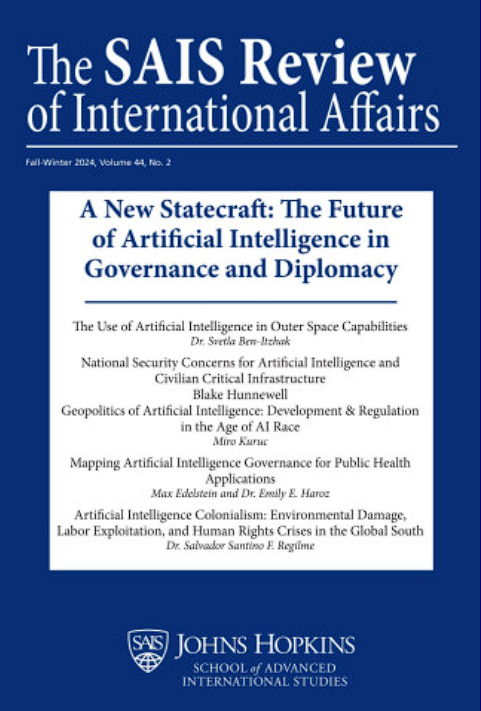
Volume 44, Number 2 — A New Statecraft: The Future of Artificial Intelligence in Governance and Diplomacy
Volume 44, Issue 2 of the SAIS Review explores how artificial intelligence will shape international relations and governance, ranging from public health to outer space.
Read the issue on Project Muse: https://muse.jhu.edu/issue/53372
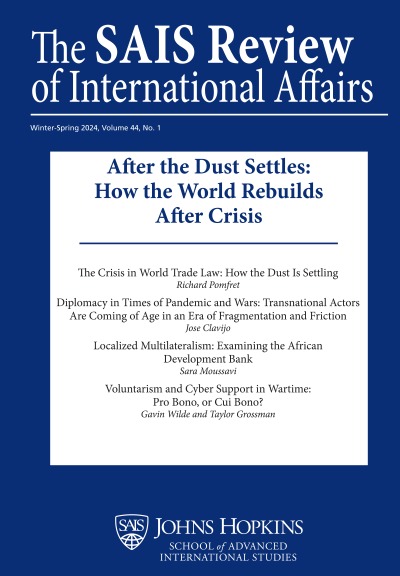
Volume 44, Number 1 — After the Dust Settles: How the World Rebuilds After Crisis
Volume 44, Issue 1 of the SAIS Review explores multilateralism and how the world rebuilds and reforms after crises.
Read the issue on Project Muse: https://muse.jhu.edu/issue/52413
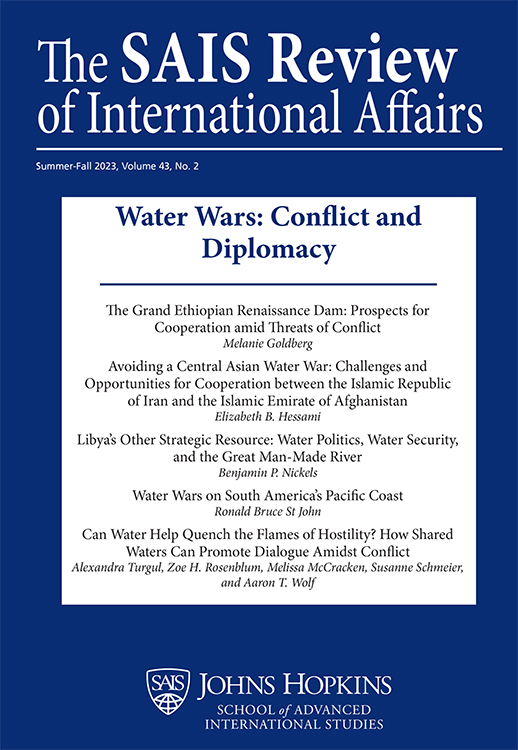
Volume 43, Issue 2 — Water Wars: Conflict and Diplomacy
Volume 43, Issue 2 of the SAIS Review explores water resources as a catalyst for conflict and competition since the beginning of human civilization.
Read the issue on Project Muse: https://muse.jhu.edu/pub/1/issue/50806
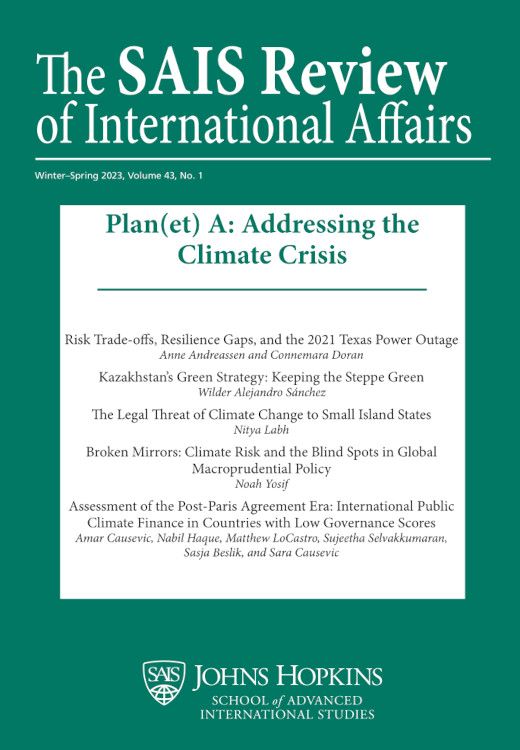
Volume 43, Issue 1 — Plane(et) A: Addressing the Climate Crisis
Volume 43, Issue 1 of the SAIS Review explores the intersectionality of climate change with major global trends and challenges including energy, financial systems, governance, injustice, and state sovereignty.
Read the issue on Project Muse: https://muse.jhu.edu/issue/50805
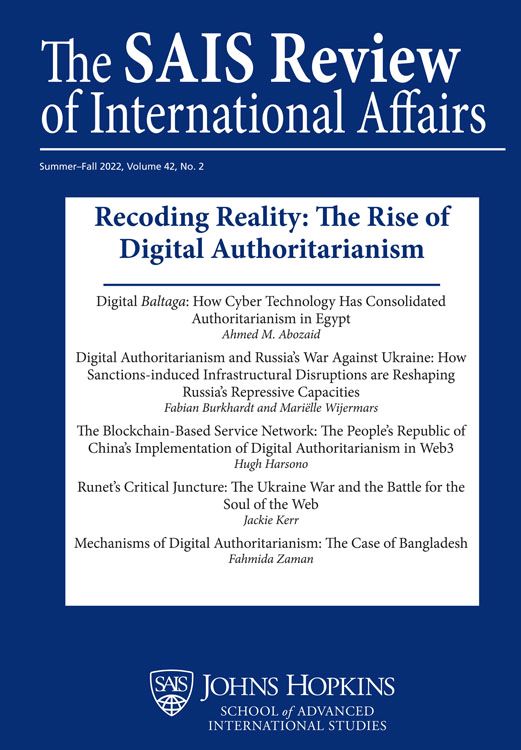
Volume 42, Issue 2 — Recoding Reality: The Rise of Digital Authoritarianism
Volume 42, Issue 2 of the SAIS Review addresses the ways in which state and nonstate actors stifle dissent with digital authoritarianism, defined as the use of information technology by regimes to manipulate, repress, and surveil domestic and international populations.
Read the issue on Project Muse: https://muse.jhu.edu/issue/49576
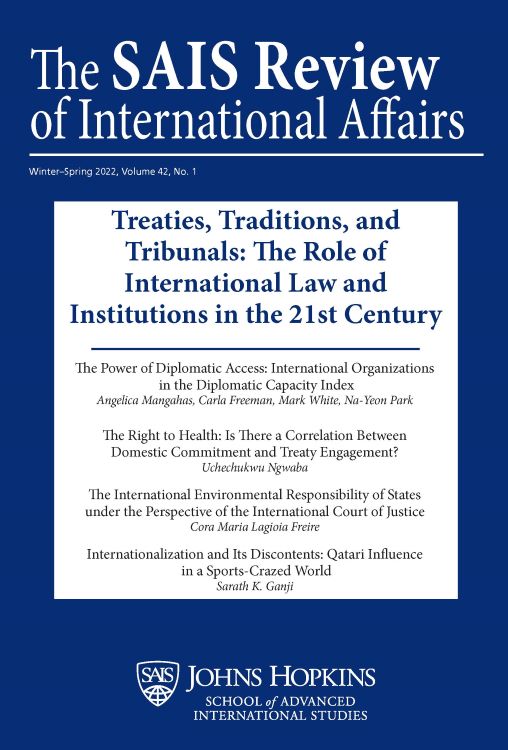
Volume 42, Issue 1 — Treaties, Traditions, and Tribunals: The Role of International Law and Institutions in the 21st Century
Volume 42, Issue 1 of the SAIS Review explores how states interpret and utilize international law and forums differently. It also addresses the difficulties faced by international bodies and the international legal framework in adequately addressing transnational issues.
Read the issue on Project Muse: https://muse.jhu.edu/issue/49577
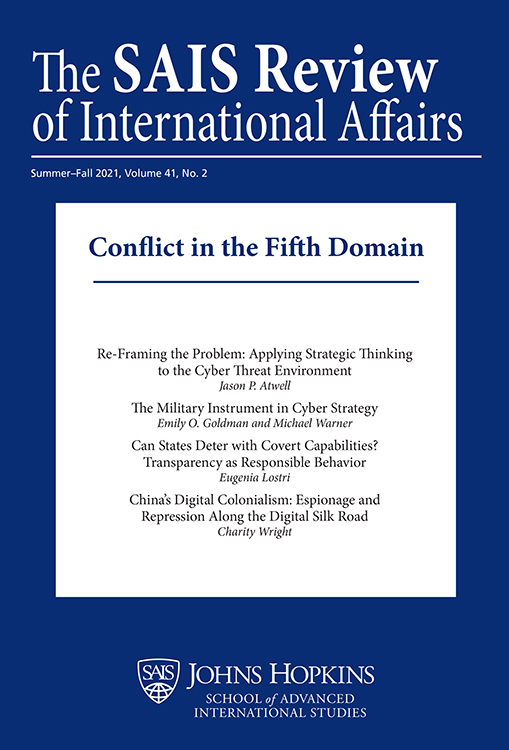
Volume 41, Issue 2 — Conflict in the Fifth Domain
Volume 41, Issue 2 of The SAIS Review of International Affairs intends to call attention to the dynamic field of cybersecurity. It is a body of work for policy experts, aspiring professionals, and cyber beginners alike. Conflict in The Fifth Domain indulges in the debate about US cybersecurity strategies, investigates how states utilize cyber operations in support of foreign policy and national security strategies, explores the foreign and domestic policy actions to best confront constant adversarial cyber threats, and envisions pathways to effective global cyber governance.
Read the issue on Project Muse: https://muse.jhu.edu/issue/47668
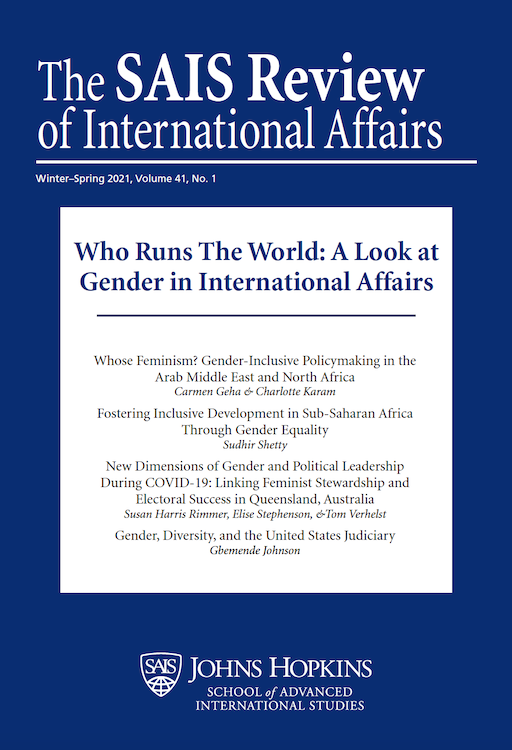
Volume 41, Issue 1 — Who Runs the World: A Look at Gender in International Affairs
Volume 41, Issue 1 of The SAIS Review of International Affairs highlights the vital yet underrepresented perspectives contributed by women and other people who do not identify as cis-gendered men to national and international policy. With this collection of essays and interviews, The SAIS Review aims to spark conversations and ideas about how to expand the pool of qualified people to “run the world” in a more equitable, peaceful, and innovative fashion.
Read the issue on Project Muse: https://muse.jhu.edu/issue/45267
Full Archive
The Revolution Will Be Televised: A Decade of Global Protest
Summer-Fall 2020
Ex Amicitia Pax: Diplomacy in Action
Winter-Spring 2020
Nuclear Weapons in the 21st Century
Summer-Fall 2019
Ethics & Foreign Policy
Winter-Spring 2019
The State of the Fourth Estate
Summer-Fall 2018
Voting: Uses & Abuses
Winter-Spring 2018
Migration and its Consequences
Summer-Fall 2017
The Future of the Religious Party
Supplement 2017
Modern Populism and its Effect on Foreign Policy
Winter-Spring 2017
Terra Incognita: Ungoverned Spaces – Space and Technology
Summer-Fall 2016
“Here Be Dragons”: Ungoverned Spaces on Land and at Sea
Winter-Spring 2016
Flying the Flag: Considering Nationalism in its Modern Incarnations
Summer-Fall 2015
The Era of Man: Environmental Security on a Changing Planet
Winter-Spring 2015
Sustaining the Millennium: Global Development from the MDGs to Post-2015
Summer-Fall 2014
Policy by Numbers: How Big Data is Transforming Security, Governance, and Development:
Winter-Spring 2014
Unchartered Waters: New Trends in Piracy, Sovereignty, and Ocean Resources:
Summer-Fall 2013
The Good, The Bad, and The Black: Informal and Illegal Economies Around the World
Winter-Spring 2013
The World in Transition: Seizing Opportunities, Balancing Risks
Summer-Fall 2012
Hidden Risks: Challenges for the International System
Winter-Spring 2012
The Young and the Old: Demography and Generations in International Relations
Summer-Fall 2011
The Politics of Play: Sport and International Affairs
Winter-Spring 2011
The Cyber Challenge: Threats and Opportunities in a Networked World
Summer-Fall 2010
Conservatism: Rising or Retreating?
Winter-Spring 2010
New International Players: A Tradition and Non-Traditional Look
Summer-Fall 2009
Cities
Winter-Spring 2009
Reengagement? International Organizations and the Next U.S. Presidency
Summer-Fall 2008
Spies
Winter-Spring 2008
Ownership Matters
Summer-Fall 2007
Populism
Winter-Spring 2007
Youth
Summer-Fall 2006
Borders
Winter-Spring 2006
Symbol and Substance
Summer-Fall 2005
Villany
Winter-Spring 2005
The Power of Populations; Religion Reinvented
Summer-Fall 2004
Smart Intelligence?
Winter-Spring 2004
Imperialism Revived: Intervention and Impact
Summer-Fall 2003
Food: Global Market, National Policies, and the International Community
Winter-Spring 2003
The Minority Rules
Summer-Fall 2002
Rotten Trade?
Winter-Spring 2002
Islams
Summer-Fall 2001
Whither Formality: Informal Economy / U.S. Africa Policy
Winter-Spring 2001
Gender and International Relations
Summer-Fall 2000
Migration
Winter-Spring 2000
The Post-Cold War Decade / Historical Revisionism
Summer-Fall 1999
NSC-68 and U.S. Foreign Policy Today / Turkey / Energy in the NIS
Winter-Spring 1999
Religion in Global Affairs; the Kyoto Accord
Summer-Fall 1998
The New Institutionalism; India
Winter-Spring 1998
Implications of Integration; Investment in Africa
Summer-Fall 1997
Post-Soviet Eurasia; Environment and Security
Winter-Spring 1997
Transitions in Asia
Summer-Fall 1996
Technology in Global Affairs; Sustainable Development
Winter-Spring 1996
The New Germany in the New Europe
Fall 1995
Adverting Crises in Africa; NATO Enlargement
Summer-Fall 1995
Political Success Stories; the U.S. Military in a New Era
Winter-Spring 1995
Political Transitions
Summer-Fall 1994
Europe’s Challenges
Winter-Spring 1994
Fiftieth Anniversary of SAIS
Summer-Fall 1993
Vol. 13, No. 1
Winter-Spring 1993
Vol. 12, No. 2
Summer-Fall 1992
Vol. 12, No. 1
Winter-Spring 1992
Order and Disorder: A New World Takes Shape
Summer-Fall 1991
A World in Transition
Winter-Spring 1991
Changes in the Post-Cold War Era
Summer-Fall 1990
American Foreign Policy in the 1990s
Winter-Spring 1990
Contradictions Between the Old and New
Summer-Fall 1989
Necessity and Choice for a New Administration
Winter-Spring 1989
Old Adversaries, New Ground
Summer-Fall 1988
Issues in U.S. Foreign Policy
Winter-Spring 1988
European Security Measures
Summer-Fall 1987
The Politics of Terrorism
Winter-Spring 1987
Money, Debt, and Democracy
Summer-Fall 1986
The Challenge to Free Trade
Winter-Spring 1986
The Nuclear Charge: Forty Years
Summer-Fall 1985
Reagan’s Second Term: Global Implications
Winter-Spring 1985
American Foreign Policy: Attitude and Action
Summer-Fall 1984
East Asia: Economic Threat or Challenge?
Winter-Spring 1984
Latin America in Turmoil
Summer-Fall 1983
Nuclear Sense or Nonsense?
Winter-Spring 1983
The Tenuous Alliance
Summer 1982
Prospects for the Middle East
Winter 1981-82
The Caribbean in Crisis
Summer 1981
U.S. Foreign Policy at the Crossroads
Winter 1980-81
Subscription Information
All subscriptions requests and address changes should be directed to the JHU Press.
Email: [email protected]
Order online at: www.press.jhu.edu/journals
Mailing address:
Johns Hopkins University Press
Journals Publishing Division
PO Box 19966
Baltimore, MD 21211
Toll-free number for charge orders:
1.800.548.1784 / Fax: 1.410.516.3866
